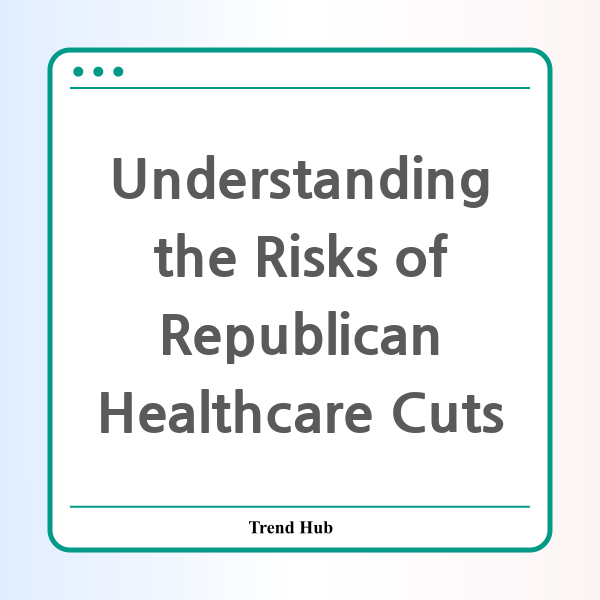* This website participates in the Amazon Affiliate Program and earns from qualifying purchases.

As the political landscape continues to evolve, one thing remains clear: healthcare is a crucial topic that affects millions of Americans. Recent proposals from Republican leaders to cut funding for healthcare programs, particularly Medicaid and Medicare, have sparked significant debate about the future of health care in the United States. But just how risky are these proposed cuts for Republican lawmakers?
Polling data reveals a striking reality: Medicaid and other federal health programs are generally popular among the American populace. According to recent surveys, eight in ten Americans hold a favorable view of Medicaid, which serves low-income families, children, and pregnant women. In contrast to the claims made by some political figures that Americans prefer private insurance, the data shows that the majority of those who have experience with Medicaid view it positively.
The Republican proposal to cut Medicaid funding by as much as $2.3 trillion, alongside potential Medicare cuts totaling around $1 trillion, positions healthcare as a pivotal issue as we approach the next election cycle. While high healthcare costs are an evident concern, with 78% of respondents deeming healthcare unaffordable, many Americans are particularly wary of cuts to government-assisted programs.
The survey findings are telling. A significant proportion of Americans—49%—believe Medicaid funding should be increased, while only 12% favor reductions. Such overwhelming support for maintaining or boosting these programs indicates potential backlash against the proposed cuts. Even among Republicans, a greater percentage were found to oppose Medicaid cuts than support them.
Moreover, when asked about specific proposals to change Medicaid, the disapproval rate was high. For instance, the idea of instituting per-capita caps on federal funding for Medicaid received support from only 21% of Americans, while 53% opposed it. Such strong sentiments suggest that cuts to Medicaid may be politically perilous for Republicans, especially in an election year.
Interestingly, the Affordable Care Act (ACA), often viewed as a hot-button issue, has gained popularity over the years, with 73% of Americans expressing favorable views of it. Repealing or significantly altering the ACA could further alienate voters. This shift in public opinion highlights a growing acceptance of government involvement in healthcare—contrary to the narrative that government programs are widely disliked.
Another intriguing aspect of the survey results reveals that a significant 55% of Americans support a government-sponsored health plan that would compete with private insurance. This is particularly notable among independent voters, many of whom remain undecided about specific healthcare proposals. The increasing acceptance of government-sponsored healthcare plans suggests a shift in public sentiment that could complicate efforts to cut existing programs.
As the 2024 elections approach, it becomes critically important for Republican lawmakers to consider the potential repercussions of their healthcare policies. While the party may prioritize budget cuts to fund tax reductions and other initiatives, the backlash against these proposals could be significant. Voters, having shown clear preferences for maintaining and expanding programs like Medicaid, may not respond favorably to drastic funding cuts.
In conclusion, healthcare is not just a political issue; it is a critical concern that touches the lives of countless Americans. The proposed cuts to Medicaid and Medicare could prove to be politically risky for Republicans. As healthcare becomes a focal point leading up to the elections, the party must navigate the complex landscape of public opinion—striking a balance between fiscal policy and the healthcare needs of their constituents.
* This website participates in the Amazon Affiliate Program and earns from qualifying purchases.